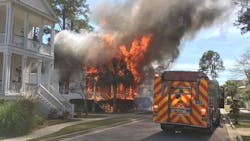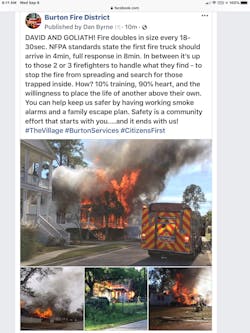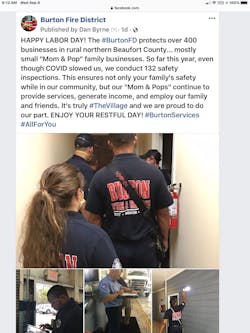Showing Our Worth Beyond Fire Prevention Week
This year has been a year of firsts and uncertainty for our nation. Above the many concerns and fears, the cries to “disband” or “defund” police can be heard across the nation. Crime and criminal justice are again a front-and-center debate that will define not only the 2020 election, but the path our nation will take for decades to come.
Our nation, our communities, our citizens and our taxpayers are divided on whether to fully disband their police departments or simply redirect funds, leaving law enforcement and our approach to criminal justice hanging in the balance.
How did we get here on something so fundamentally important to any society as law and order, justice and those who provide this basic fundamental service? And to question it to such a level that citizens have taken to the streets in protest that, at times, have become so violent that lives have been lost.
Crime was once a growing problem in our nation. According to an article by Lauren-Brooke Eisen, director of the Brennan Center’s Justice Program, crime was identified as the biggest problem facing our country in the 1990s.
In response, in 1994 Congress passed the Violent Crime Control and Law Enforcement Act, which is described by Udi Ofer of the ACLU as the “largest crime Bill in the history of the United States.” The Bill provided $18.4 million in funding for law enforcement programs and 100,000 more law enforcement officers.
I personally remember being a U.S. Marine in 1994 and having police departments from across our nation come on base to recruit us to join their ranks by offering cash bonuses. According to a 2019 article entitled “5 Facts About Crime in the U.S.” by John Gramlich, which cites FBI and BJS reports, there was a 50% to 71% drop in violent crime between 1993 and 2018.
Whether the Crime Bill played a role in this reported crime reduction is up to the reader to research and determine. But regardless of the conclusion, there is a lesson here for the fire service.
To place this crime/law discussion in perspective: There was a problem—crime. There was then a proposed solution with the Crime Bill, which provided federal guidance and funding to address the problem. The problem declined. Society got complacent. Society is now attacking and questioning the entire profession and institution of law enforcement and the need for the funding that possibly led to the reduction in the original problem.
We, too, had a fire problem in the 1970s and decades prior. We also had landmark legislation passed by Congress called the Federal Fire Prevention and Control Act, which allotted $153 million in annual funding.
Starting in 1974, the nation saw a decline in fires and fire deaths, which leveled off in the mid-90s. Those of us in the fire service during the 2008 recession remember being attacked by our community leaders who cited this very decline in fires as justification in making drastic cuts to their fire departments.
The city manager of a community I worked for at the time began to ask questions such as “Why are we paying firefighters to sleep?” “Why do we need such large fire trucks.” Our citizens, fearing their ability financially to provide the basics of life (Maslow’s Hierarchy of Needs) due to the recession, were largely silent as dangerous and drastic changes took place that still continue in that community.
To place this perspective: There was a problem—fire. There was then a proposed solution with the Fire Prevention and Control Act, which provided federal guidance and funding to address the problem. The problem declined. Society got complacent. Society then attacked and questioned the entire profession and basic safety concepts of the fire service such as staffing, apparatus and station locations.
The moral to this story is this: Do not allow your community to become complacent!
I love our brothers and sisters in blue, but in my estimation, while they have done well in public relations, they have not done so well in public education. As evidenced by the recent cries to “defund police,” just because you make an impression and people smile or shake your hand and thank you, it doesn’t always equate to political and financial support. An “impression” can quickly be changed by a 15-second video. What is more difficult to change and debate are known facts provided through continuous education.
Largely, our beloved fire service is paralleling this current law enforcement cautionary tale. For decades we have rested on past laurels of heroics and relied simply on public relations to carry us. We provide fire trucks for the community to see at public events, we hand out goodies and plastic fire hats, people smile, shake our hand and say thank you. But, as we found out in 2008, that didn’t equate to political and financial support for thousands of fire departments across this nation who had to fight for survival, and who still suffer today from poor decisions made by crafty community managers and an uneducated citizenry.
We can change that during Fire Prevention Week. Use this year's FPW as a week to educate your community, not just on fire prevention but also on the needs of your fire departments that are matched with statistics and facts to support those needs. For example, rather than simply stating fire grows quickly and you need smoke alarms, expand on this education:
“According to studies, fire doubles in size every 18-30 seconds. The National Fire Protection Association standards for basic fire protection states that one fire engine with four firefighters should arrive within four minutes of receiving the alarm, and 15-27 firefighters (depending on the structure involved) should arrive within eight minutes. Until we arrive on scene, many times with less than the standard four firefighters, it is paramount that your family has working smoke alarms inside and outside of every bedroom on every living level of your home less than 10 years old, sleep with bedroom doors closed, and have a family escape plan that is practiced.”
While fire prevention is always a goal, use this Fire Prevention Week to also educate your community on your fire department, what it takes to provide services, the standards that govern those services, what your department is doing to meet those standards, and the challenges you face in providing the level of service that allows your community to sleep soundly knowing that they are protected.
In short, do not let your community become complacent on the dangers it faces, nor ignorant to the risks and benefits when making decisions governing policy and budgets. Set a solid educational foundation of community knowledge you then can build on and add to all year long, and also refer back to when there is a disaster or loss.
Our brothers and sisters in blue have done a tremendous job in reducing crime and keeping our communities safe. They’ve done so well, that many in their community no longer see a need for the support and funding needed to provide and continue that service. While it may be the case in some communities, on a national level, the fire service has not been the focus of these questions yet. But we ignore this lesson at our own peril.
According to the Pew Research Center, in 2018 crime was viewed as a problem facing our urban, suburban, and rural communities. Fire did not make the list. But just a year later, in a study on the major problems facing our country, crime didn’t even make that list… and again, neither did fire.
Yes, we ignore this lesson at our own peril. Take advantage this FPW to plan and to educate.
About the Author

Daniel Byrne
DANIEL BYRNE is a community support officer for the Burton Fire District, Beaufort County, SC, and a retired assistant fire chief of training for the Georgia Air National Guard 165th Fire Department. A third-generation firefighter, he holds an associate degree and a bachelor’s degree in fire science as well as a master’s degree in public administration and disaster management. Byrne is an alumnus of the National Fire Academy. He received state and local awards for public relations and educational programs as well as community partnerships and served as a conference presenter and keynote speaker.


